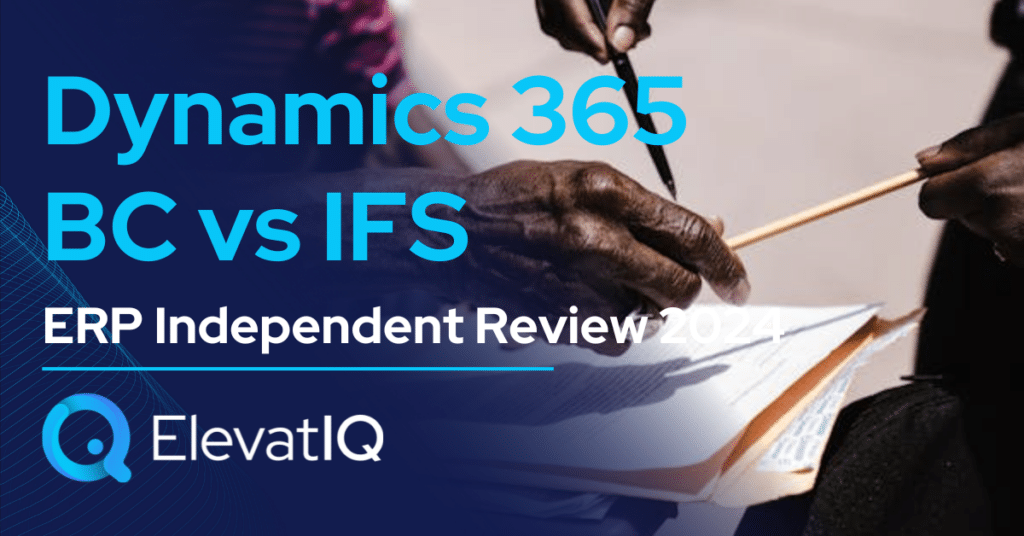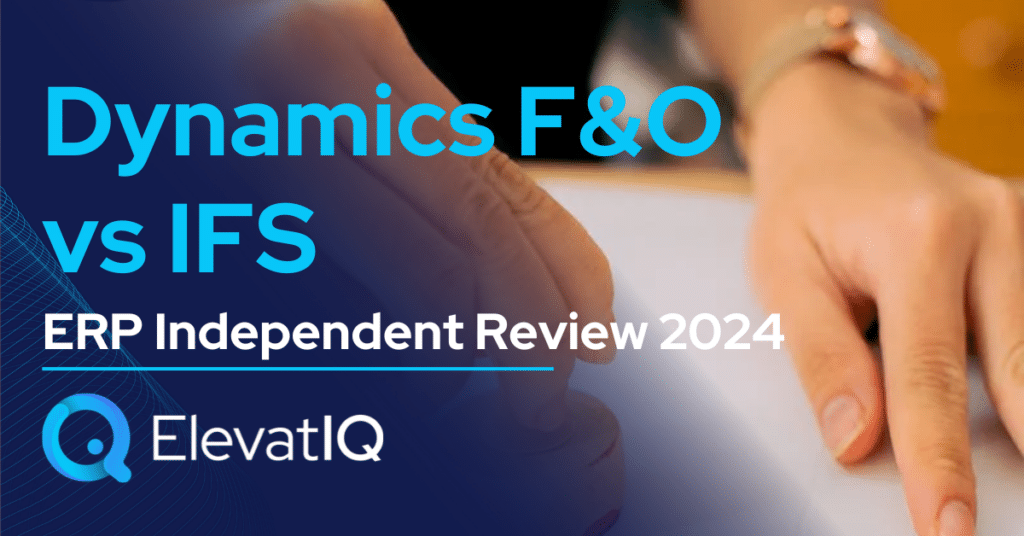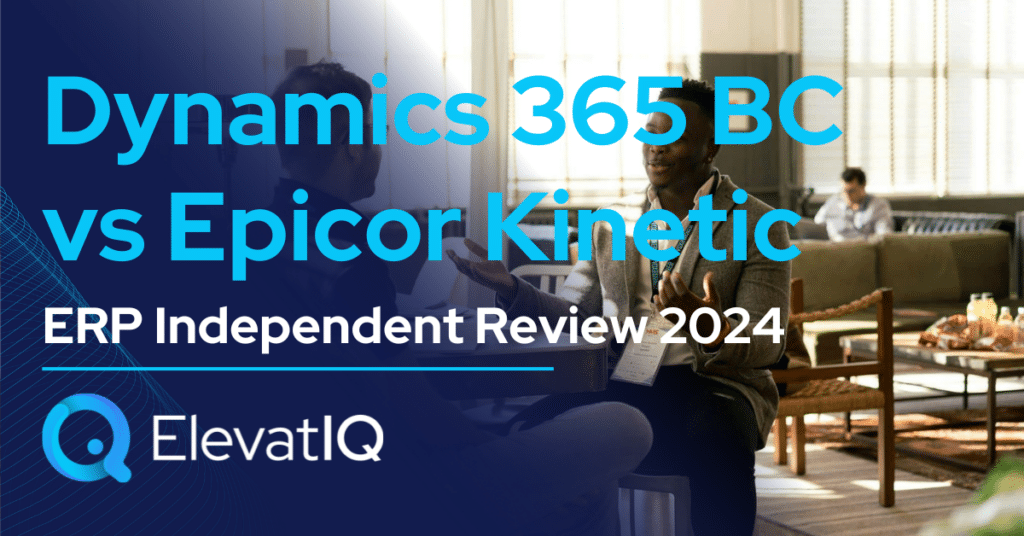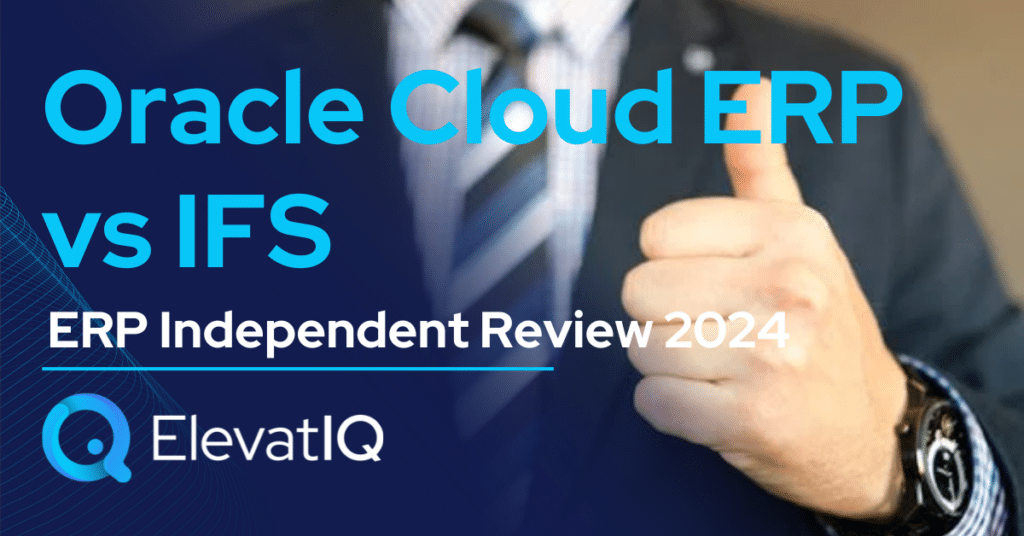Microsoft Dynamics 365 BC serves as a logical choice particularly for companies outgrowing smaller ERP, MRP, and accounting systems like QuickBooks, Microsoft GP, Odoo, Katana, or Fulcrum. On the other hand, similar to other upper mid-market ERP solutions like Infor LN, QAD, or Sage X3, IFS boasts extensive functionality that is tailored for companies heavy in asset and field service operations. The sweet spot for Dynamics 365 BC would be $30M-$250 in revenue. Whereas, IFS is positioned for companies within the $100M – $1B revenue range, with a significant portion nearing the $1B mark.
Companies in a higher revenue band often use MS Dynamics 365 BC just for accounting and financial reporting while using mature operational systems at the subsidiary level. On the other hand, IFS boasts robust global, multi-entity capabilities and operates as a cloud-native solution. IFS not only delivers functional capabilities but also efficiently manages the transactional workload of upper-mid-market companies.
The biggest advantage of MS Dynamics 365 BC is its consulting ecosystem and community support, which is much bigger than most ERP ecosystems. On the other hand, IFS appeals to enterprises seeking mature, industry-specific capabilities, reducing the need for extensive development with vanilla ERP systems like SAP or Oracle. Therefore, choosing between Dynamics 365 BC vs IFS requires a detailed examination, and this comparison offers valuable insights for ERP selection projects. Let’s delve deeper into the specifics.
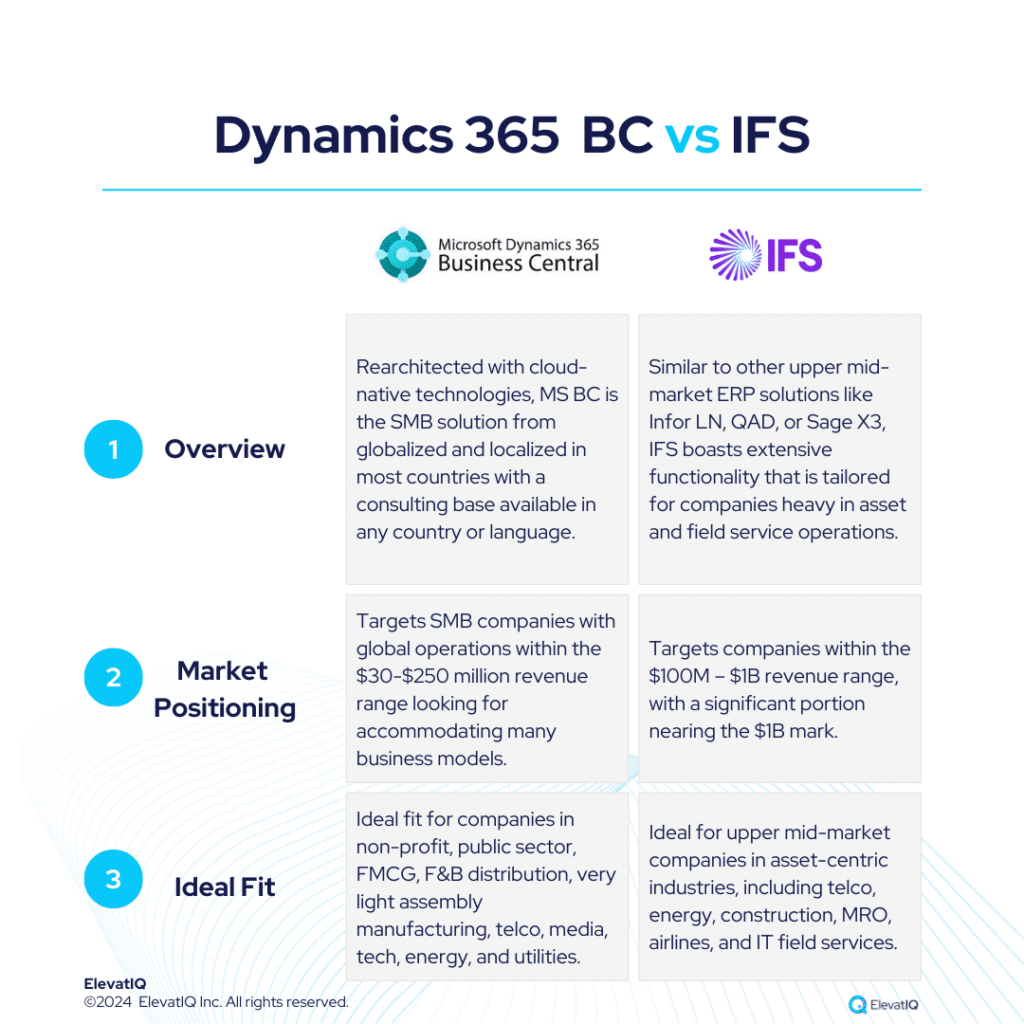

| MS Dynamics 365 BC | IFS | |
| Started in | 2018 (Previously NAV) | 1986 |
| Ownership by | Microsoft | EQT |
| No. of customers | 60,000+ | 6,500+ |
What Is MS Dynamics 365 BC?
Rearchitected with cloud-native technologies, Microsoft Dynamics 365 BC is the SMB solution from Microsoft, globalized and also localized in most countries with a consulting base available virtually in any country or language. Microsoft Dynamics 365 BC serves as a logical choice for companies outgrowing particularly smaller ERP, MRP, and accounting systems like QuickBooks, Microsoft GP, Odoo, Katana, or Fulcrum. It is positioned against competitors such as Netsuite, Sage Intacct, and Acumatica. It also offers a vibrant ecosystem with numerous add-ons catering to industry-specific needs.
The sweet spot for MS Dynamics 365 BC would be $30M-$250 in revenue and a higher revenue band for companies that might use MS Dynamics 365 BC just for accounting and financial reporting while using mature operational systems at the subsidiary level. The biggest advantage of MS Dynamics 365 BC is its consulting ecosystem and community support, which is much bigger than most ERP ecosystems, and that’s why it’s probably one of the most popular solutions across geographies.
Microsoft Dynamics 365 BC is also ideal for companies with diversified, global operations aspiring to keep all of their entities in one database for easier reconciliation and tracking. While the add-ons might allow companies to use Microsoft Dynamics 365 BC for complex industrial operations, the natural design and core would be compatible with companies in industries such as non-profit, public sector, FMCG, F&B distribution, very light assembly manufacturing, telco, media, tech, energy, and utilities.
What Is IFS?
Similar to other upper mid-market ERP solutions like Infor LN, QAD, or Sage X3, IFS also boasts extensive functionality. This functionality is particularly tailored for companies heavy in asset and field service operations. Positioned uniquely in the market, IFS appeals to enterprises particularly seeking mature, industry-specific capabilities, reducing the need for extensive development with vanilla ERP systems like SAP or Oracle. IFS also serves as an optimal alternative in the upper mid-market space, offering standalone best-of-breed asset management and field service capabilities or a comprehensive ERP solution meticulously crafted for asset-centric industries, including telco, energy, construction, MRO, airlines, and IT field services.
The IFS data model surpasses the complexity of smaller systems like Acumatica or NetSuite, demanding an experienced internal team and also external advisory support to successfully align process and data codings with the intricate IFS data model. It is an ideal choice for upper mid-market companies outgrowing smaller systems, such as Acumatica or NetSuite, and requiring mature capabilities for enterprise-wide asset scheduling and maintenance. IFS not only delivers functional capabilities but also efficiently manages the transactional workload of upper-mid-market companies.
IFS also boasts robust global, multi-entity capabilities and operates as a cloud-native solution. The majority of IFS customers particularly fall within the $100M – $1B revenue range, with a significant portion nearing the $1B mark. While IFS has its roots in Europe, they have been trying to grow its presence in North America. In 2023, IFS also made strategic acquisitions to enhance its AI and shop floor capabilities.
Dynamics 365 BC vs IFS Comparison
Navigating the choice between Dynamics 365 BC vs IFS is a significant decision for businesses particularly looking for operational efficiency and strategic alignment. Thus, this section delves into the comprehensive comparison of Dynamics 365 BC vs IFS across various critical dimensions.
| Dynamics 365 BC | IFS | |
| Global Operational Capabilities | Supported and actively installed in most countries globally. | Has robust global multi-entity capabilities. |
| Diverse Capabilities | Supports multiple industries and also business models. | Companies with a diverse business model, such as manufacturing or expecting changes with the model, might struggle. |
| Best-of-breed Capabilities | Pre-integrated with Microsoft CRM and field service but relies on third-party add-ons for additional capabilities. | Has one of the strongest field service and asset management capabilities. |
| Last-mile Capabilities | May require add-ons for specific micro-verticals. | Often require add-ons for specific micro-verticals. |
| Operational Functionalities | Emphasizes core ERP capabilities, relying on partner add-ons particularly for industry-specific capabilities. | The operational capabilities would be deeper in some areas, making it a best-of-breed option for enterprise-grade asset and field service-centric use cases used alongside another ERP as a corporate ledger. |
| Integration Capabilities | Common data model, power platform and automate along with MS Azure platform for additional development and integration. | Good fit for those seeking best-of-breed field service capabilities for a subsidiary or integrated with a corporate financial ledger. |
| Manufacturing Capabilities | Lighter manufacturing capabilities. | Has comparatively limited manufacturing capabilities. |
| Pricing Model | Per named user, per month. (True consumption-based) | Recurring subscription-based model |
| Key Modules | 1. Financial Management 2. CRM 3. Distribution Management 4. Supply Chain Management 5. Project Accounting Management 6. Inventory Management 7. Reporting, Dashboard and BI | 1. Manufacturing 2. Supply Chain Management 3. Projects 4. Finance 5. Human Capital Management 6. Procurement 7. Customer Relationship Management 8. Commerce |
Dynamics 365 BC vs IFS Feature Comparison
Both platforms offer a plethora of features and functionalities designed to streamline business operations and enhance efficiency. In this feature comparison, we delve into particularly the distinct capabilities of Dynamics 365 BC vs IFS across various critical dimensions, providing insights to aid businesses in making informed decisions regarding their ERP selection. Thus, this section discusses features under each of the following modules, particularly financial management, supply chain management, and manufacturing management.
Financial Management Comparison
In this section, we are discussing a detailed comparison of the financial management capabilities particularly offered by Dynamics 365 BC vs IFS. By examining their respective strengths and functionalities, particularly in managing financial processes. Businesses can therefore gain valuable insights to determine the best-suited ERP solution for their financial management needs.
| Dynamics 365 BC | IFS | ||
| Financial Management | General Ledger | Initiates general ledger postings, chart of accounts, general journals, VAT facilities, recurring journals, and source codes. | Centralizes financial data management, enabling accounting, reporting, and analysis. |
| Accounts Receivable and Accounts Payable | Automates accounts receivables and payables and facilitates seamless reconciliation of accounts for swift and precise financial reporting. | Streamlines customer invoicing, payment processes, vendor invoices and also payments. | |
| Cash Flow Management | Provides comprehensive forecasting, analysis, and Azure ML-based prediction of cash inflows and outflows. | Enables accurate planning and forecasting of cash activities, and analyze liquidity and cash positions. | |
| Currency Management | Manages multiple currencies across the system, including payables and receivables, general ledger reports, resource and inventory items, and bank accounts. | Handles transactions in multiple currencies, automatically calculating exchange rates and converting transactions into the base currency. | |
| Tax Management | Offers automated, configurable, and scalable tax determination, calculation, and settlement capabilities, accommodating complex tax scenarios across various business requirements. | Automates and manages tax calculations, compliance, and reporting across multiple jurisdictions. |
Supply Chain Management Comparison
In this comparison, we explore and analyze the supply chain management capabilities of Dynamics 365 BC vs IFS, shedding light particularly on their respective strengths and weaknesses.
| MS Dynamics 365 BC | IFS | ||
| Supply Chain Management | Warehouse Management | Can be implemented in different complexity levels, depending on a company’s processes and order volume. The main difference is that activities are performed order-by-order in basic warehousing when they are consolidated for multiple orders in advanced warehousing. | Enables businesses to efficiently manage warehouse operations by automating the physical storage and retrieval of inventory items. |
| Service Management | Service management is not built as part of the core platform but a pre-integrated specialized app is available for field service operations. | Enables organizations to efficiently manage their field service operations, including planning, scheduling, dispatching, and mobile workforce management. | |
| Inventory Management | Ensures inventory availability by automatically computing stock levels, lead times, and reorder thresholds. Also, maintains optimal inventory levels by adjusting orders dynamically based on real-time inventory updates. | Provides real-time visibility into stock movements, allowing businesses to maintain optimal inventory levels by setting reorder points and reducing the risk of overstocking and stock-outs. | |
| Purchase Order Management | Manages purchase orders, including blanket orders and related processes. | Streamlines the procurement process by automating the creation, tracking, and approval of purchase orders, ensuring efficient and accurate order fulfillment. | |
| Sales Order Management | Manages sales orders, including blanket sales orders and associated processes. | Efficiently handles the entire sales order process from quotation to invoicing, ensuring accurate order fulfillment and real-time tracking across multiple sites. | |
| Requisition Management | Organizes complex distribution processes involving multiple products and suppliers. | Simplifies the procurement process by allowing users to create, track, and approve requisitions, ensuring that all purchase requests are efficiently managed and fulfilled. |
Manufacturing Management Comparison
In this comparison, we explore and analyze the manufacturing management capabilities of MS Dynamics 365 BC vs IFS, shedding light, particularly on their respective strengths and weaknesses.
| MS Dynamics 365 BC | IFS | ||
| Manufacturing Management | Production Planning | Enables the creation of production orders, definition of routings, allocation of resources, and optimization of production sequences, ensuring seamless operations. | Optimizes manufacturing processes by providing tools for capacity planning, production scheduling, material requirements planning, and shop floor control, ensuring real-time visibility and efficiency. |
| BOM and Routing | Allows for the detailed mapping of production processes, including the components, subassemblies, and resources used, as well as the sequence of operations. | Streamlines manufacturing by detailing the components and materials needed for production and defining the sequence of operations required to produce a finished product. | |
| Advanced Planning and Scheduling | Takes into account all demand and supply data, nets the results, and creates suggestions for balancing the supply to meet the demand, ensuring optimized resource utilization and efficient production control. | Enhances manufacturing efficiency by optimizing resource allocation, production schedules, and material requirements through advanced algorithms and real-time data analysis. |
Pros of Dynamics 365 BC vs IFS
When evaluating ERP solutions, understanding the distinct advantages of Dynamics 365 BC vs IFS is crucial. In this section, we are particularly exploring the strengths of Dynamics 365 BC vs IFS across various dimensions. Thus, shedding light on their respective capabilities and functionalities.
| Dynamics 365 BC | IFS |
| Natively supports global regions and localizations where Acumatica, Epicor, or Infor might have limited support. | One of the most consistent user experiences that have been rearchitected and modernized. |
| Unlike several products it has support for several European, Asian, and African countries where most products might struggle. | One of the strongest asset-management capabilities for organizations with very thick asset and predictive maintenance needs. |
| The data model is friendlier for FMCG and distribution companies requiring native support for complex features such as bin tracking or license plate support. | Designed to handle large programs where consolidated visibility would be critical without ad-hoc arrangements. |
| The product has been completely rearchitected using the cloud-native architecture. Cloud ERP capabilities are stronger than those of competing products. | Unique financial workflows to support complex project manufacturing programs. |
Cons of Dynamics 365 BC vs IFS
Just like recognizing strengths is important, it’s also crucial to weigh the specific drawbacks of Dynamics 365 BC vs IFS. Therefore, in this section, we will delve into the limitations and challenges associated with Dynamics 365 BC vs IFS across various operational and financial dimensions.
| MS Dynamics 365 BC | IFS |
| Only fit for FMCG-centric distributors. The industrial distribution would require add-ons to support capabilities. | Has a limited presence in North America and also a lean partner ecosystem. |
| While the ecosystem may have options for distribution industries, it might not have integrations with the best-of-breed eCommerce systems in the industrial distribution space. | Companies with a diverse business model, might outgrow or struggle with the solution. |
| The financial traceability may not be as intuitive for global, publicly traded non-profit companies. | Companies involved with the M&A or the ones part of the PE portfolio might not be the best fit for IFS. |
| The data layers are highly detailed, requiring substantial consulting help to be successful. | IFS might not be the best fit to be used just as the corporate ledger for large project manufacturing enterprises. |
Conclusion
In conclusion, both Dynamics 365 BC vs IFS present robust ERP solutions tailored to different business needs and revenue scales. Dynamics 365 BC particularly shines for small to medium-sized enterprises with global operations, offering a flexible, cloud-native solution that supports a wide range of industries from FMCG to utilities. Its vibrant consulting ecosystem and support across multiple geographies make it a popular choice, particularly for companies requiring scalable financial and accounting tools. However, its reliance on add-ons for specific industry needs may limit its functionality for highly specialized businesses.
On the other hand, IFS is an ideal choice for larger, asset-centric organizations that require deep, industry-specific capabilities such as field service and asset management. Its cloud-native architecture, global multi-entity support, and extensive functionality cater to enterprises particularly within the $100M–$1B revenue range. While IFS excels in handling complex operations and large-scale projects, it may pose challenges for businesses with diverse models or those seeking simpler solutions.
Both systems have their strengths and limitations, so businesses should carefully evaluate their specific needs and growth aspirations to determine the most suitable ERP solution. Also, seeking assistance from an independent ERP consultant can significantly aid the decision-making process. To get a 360-degree view of feature comparisons, it’s essential to explore not only Dynamics 365 BC vs. IFS but also insights from other analyses such as Dynamics 365 BC vs. NetSuite, SAP S/4 HANA, Acumatica, Dynamics F&O, Oracle Cloud ERP, Infor LN, Infor M3 and Epicor Kinetic.



